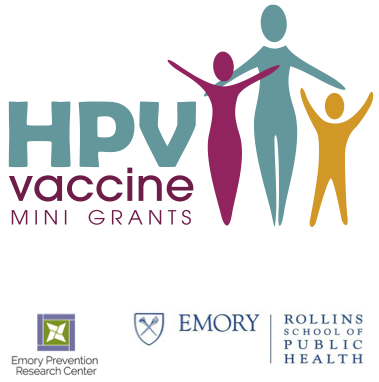

Emory Cancer Prevention and
Control Research Network
Despite the growing number of evidence-based cancer prevention and control interventions and strategies to reduce the burden of cancer, most are not well adopted in local communities. The Emory CPCRN will increase the translation of cancer and HPV vaccine evidence into local communities. Wider use of effective interventions can significantly reduce cancer morbidity and mortality.
The Emory CPCRN has 6 inter-related aims and will:
- Maintain and strengthen the Emory CPCRN infrastructure to support and enhance capacity-building for cancer prevention and control and implementation science research and practice at Emory and in rural communities across Georgia;
- Cultivate and strengthen partnerships with communities, public health agencies, community-based organizations, and cancer control research and practice networks to promote community-based participatory approaches to preventing cancer and reducing health disparities;
- Conduct national and local trainings to build capacity on adoption and implementation of evidence-based approaches in collaboration with our Southwest GA partners and regional cancer coalitions;
- Assess factors related to HPV vaccination using the P3 (Practice, Provider, and Patient-Level) model to inform intervention development through a qualitative study in Southwest Georgia;
- a. Evaluate a multi-level intervention employing implementation strategies of mini-grants and technical assistance on HPV vaccine series initiation and completion among clinical and community organizations in SW Georgia;
b. Assess implementation outcomes and factors related to implementation success using the Consolidated Framework for Implementation Research (CFIR) through a mixed-methods study; and - Disseminate and translate research findings to local, regional and national cancer control researchers and practitioners.
The Emory CPCRN proposed aims will enhance the capacity of clinical and community organizations in Southwest Georgia and the state through training, research and dissemination efforts. We will contribute a model for testing intervention strategies for clinical and community organizations to adopt evidence-based interventions for increasing HPV vaccination rates.
Aim 5a & 5b: HPV Mini-Grants Program (June 2022-current)

HPV Vaccination Toolkit: This toolkit contains a collection of evidence-based strategies to improve HPV vaccination rates using a multi-level approach. This toolkit was developed for the purpose of the HPV Vaccine Mini-grants Program run by Emory CPCRN. The purpose of the program was to implement a multi-level intervention using evidence-based strategies to promote and increase HPV vaccination rates in rural communities.
The Emory Prevention Research Center and Emory CPCRN provides funding and technical assistance to community organizations and health systems who offer the HPV vaccine in Southwest Georgia.
Emory CPCRN will evaluate the implementation of the multi-level intervention at each mini-grant recipient site. Sites can range from pediatric, family medicine, or internal medicine practices to university health centers, health departments or other public and private health clinics. Recipients receive funding up to $10,000 to support HPV vaccination delivery program expenses and receive assistance from Emory CPCRN staff in conducting their program. The multi-level intervention will include 2 out of the 3 levels (patient or caregiver; provider; or health system) for education, training, or organizational change. After the year, we will assess changes in HPV vaccination rates and barriers and facilitating factors related to implementation of the multi-level intervention.
The CPCRN is supported by the Division of Cancer Prevention and Control in CDC. The 4 funded sites are: Baker, Dougherty, Mitchell, and Seminole County Health Departments. The sites can choose evidence-based strategies to promote vaccination at 2 of 3 levels: patient, provider, or practice level. Emory Rollins School of Public Health is providing a Min-grants Program toolkit, and technical assistance in their implementation. The principal investigator is Dr. Cam Escoffery and the Program Director is Courtney Petagna, MPH. Emory CPCRN is excited to work with all of these sites to increase HPV vaccination in southwest Georgia.
Aim 4: HPV Qualitative Study (June 2020-June 2022)
This study assessed barriers and facilitators related to HPV vaccination in Southwest Georgia using the P3 (Practice, Provider, and Patient-Level) model. We conducted interviews with parents who vaccinated their children with the HPV vaccine and parents who did not, young adults who were either vaccinated or not vaccinated, and providers and public health professionals related to these factors. Data collection concluded in June 2022 and the paper will be coming soon!
Aim 4: HPV Systematic Review (April 2020-current)
Emory CPCRN collaborated with other national CPCRN institutions have updated a systematic review on interventions promoting HPV vaccination to assess the current findings related to audience and setting, intervention components, multilevel interventions and significant results related to HPV vaccination rates. Eligible articles are intervention studies that focused on HPV vaccine promotion from May 2015-December 2020. The data on the types of intervention and effective strategies employed will inform the delivery of the multi-level interventions in Aim 5a & 5b.
CPCRN Scholars Program (2021-current)
Emory CPCRN collaborates with University of South Carolina CPCRN to run the CPCRN Scholars Program. This program is for graduate/doctoral students, postdoctoral fellows, junior faculty, practitioners, and other health professionals in dissemination and implementation (D&I) science focused on cancer prevention and control and health equity. During the year long program scholars engage with dissemination and implementation curriculum, webinars, mixers, and in mentored projects that align with their interests in either dissemination and implementation or cancer prevention and control. The program started in 2021 and applications for the third cohort will launch in August 2022. For more information contact Courtney Petagna.